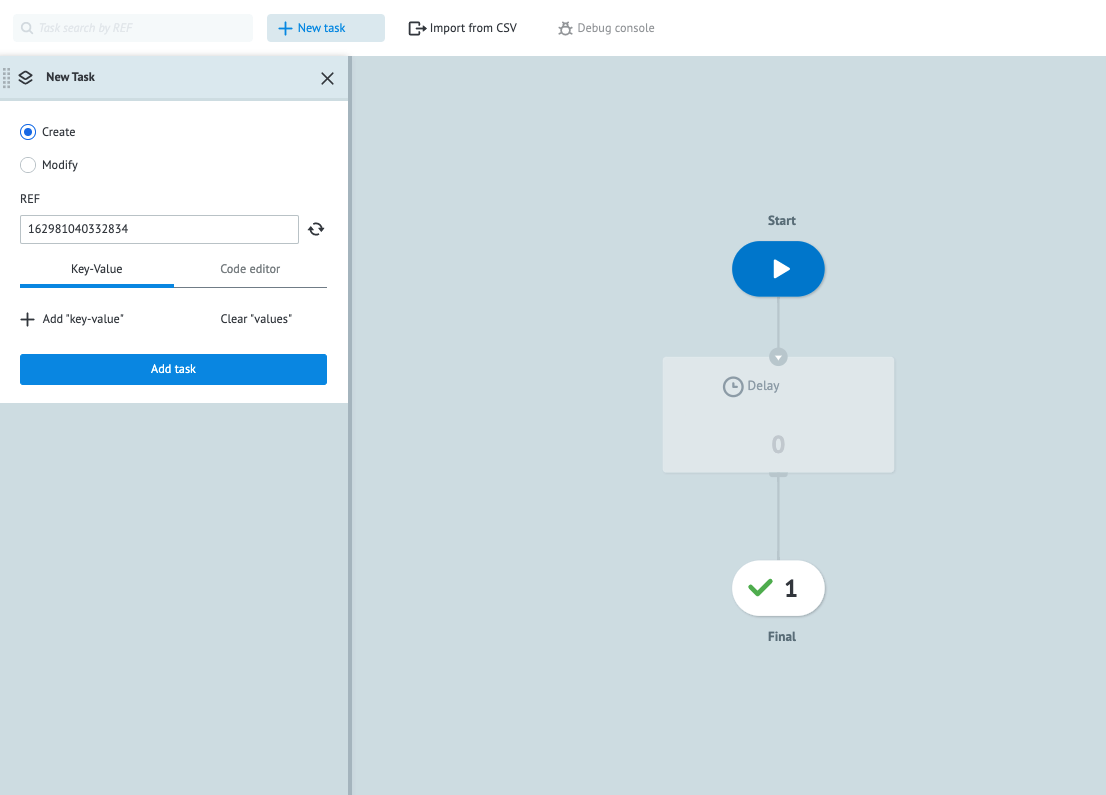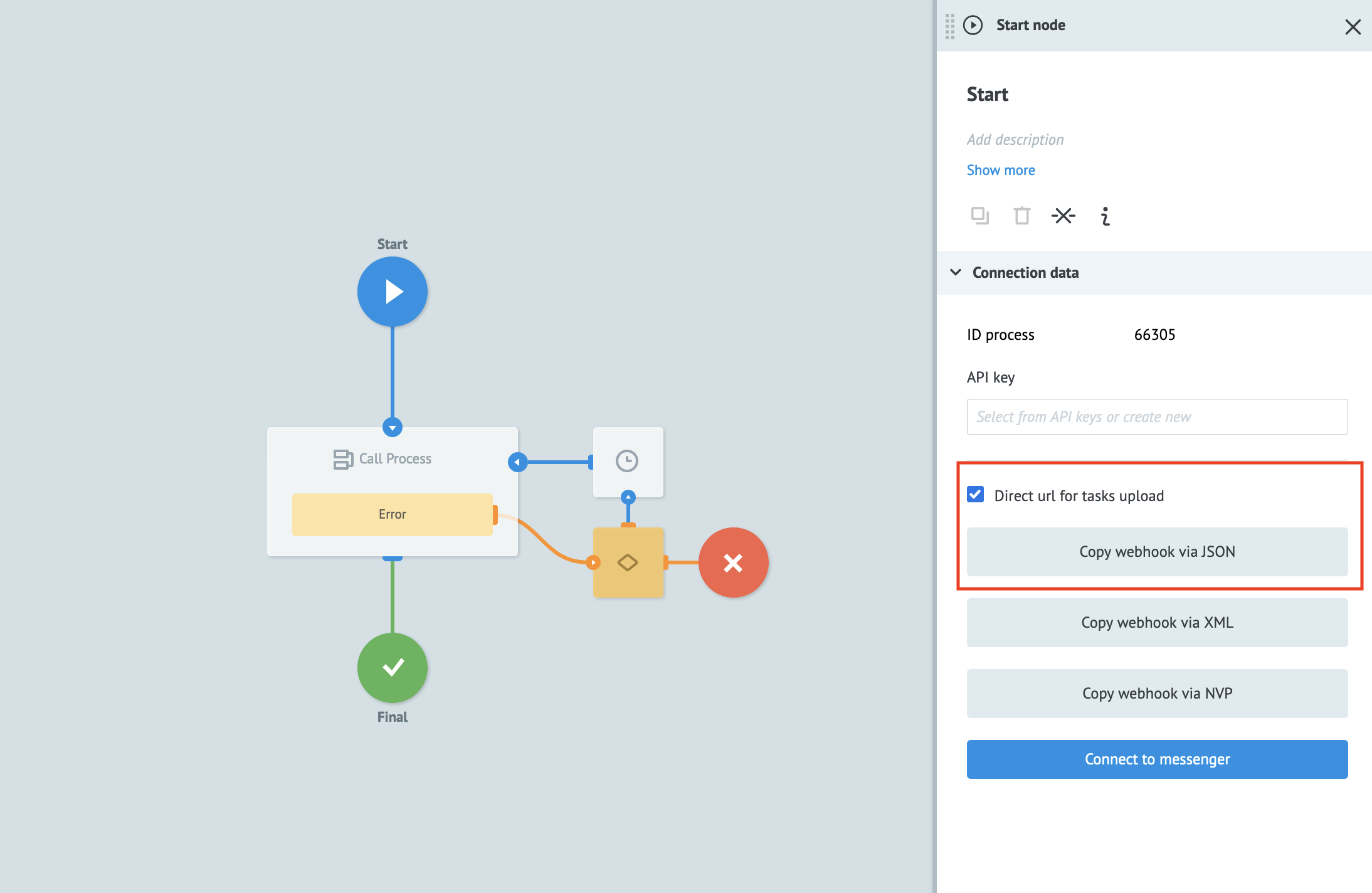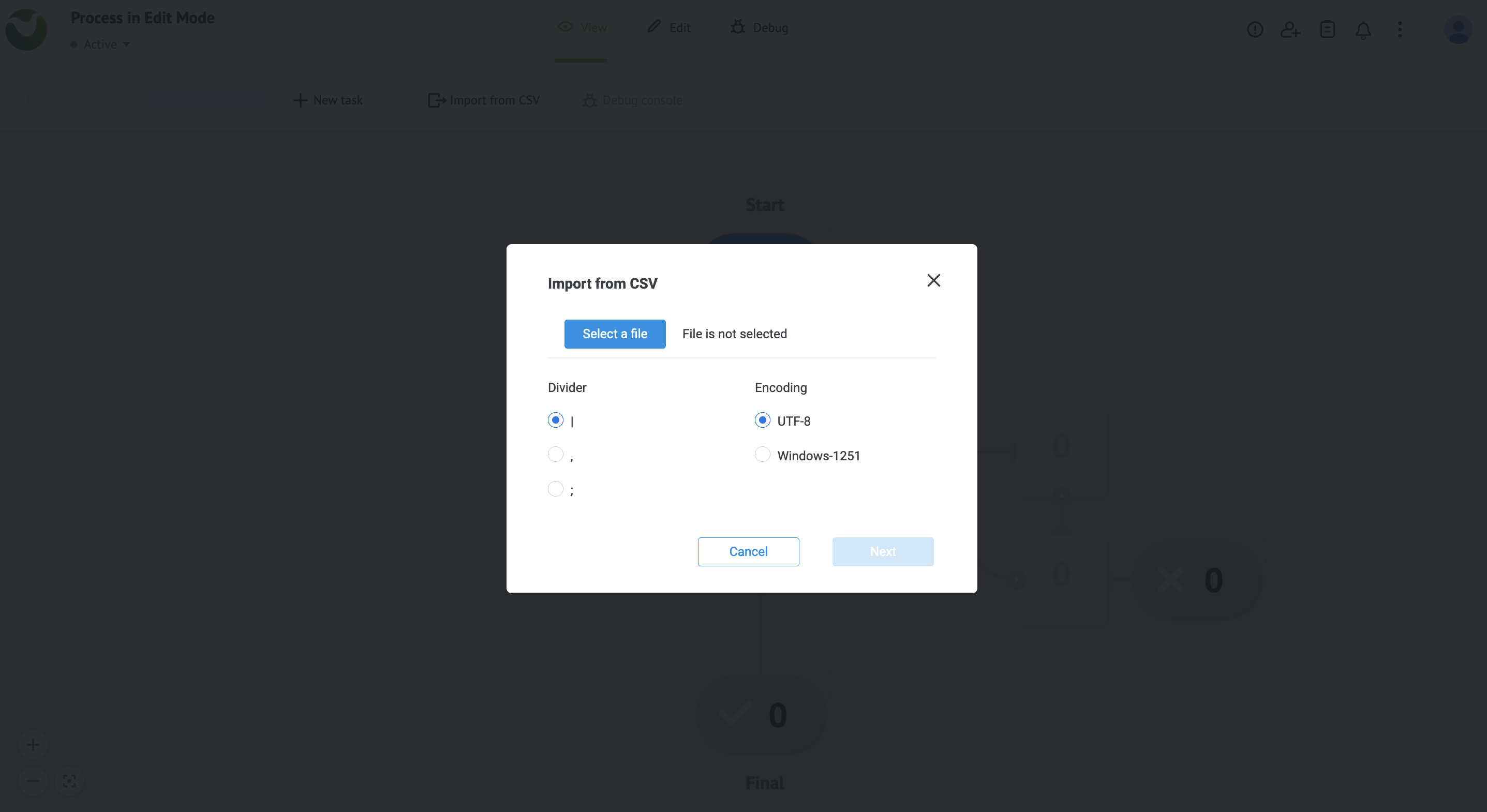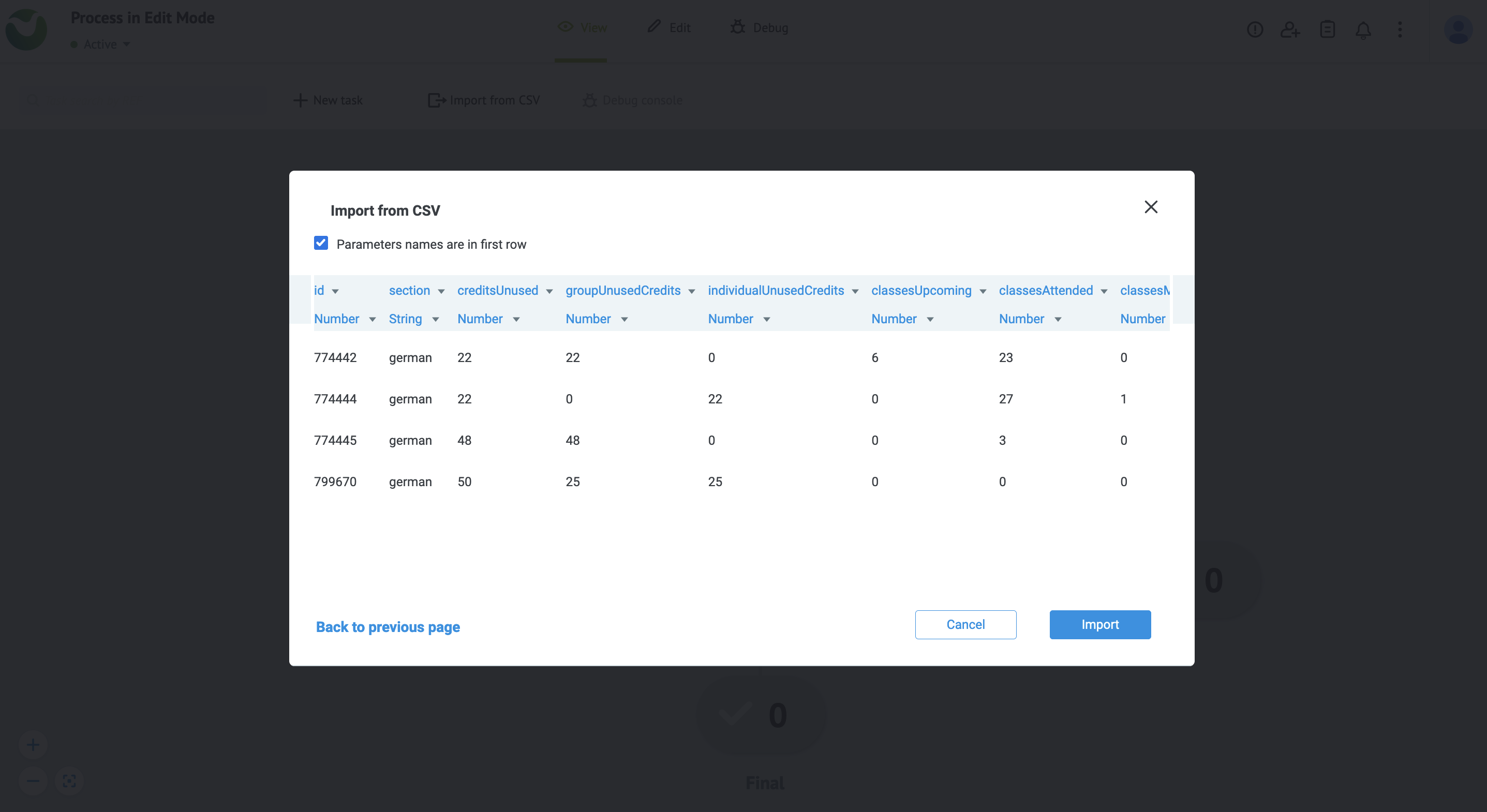Triggering Tasks
There are five ways to trigger a task in Mambu Process Orchestrator (MPO):
- Manually trigger a task in the MPO UI. Generally used only for testing during the development stage.
- Use a direct URL, when you need to trigger a task from an external service.
- Via the MPO API.
- Via Sync API, when you need a task response to be handled synchronously.
- Import a CSV file to trigger multiple tasks at once in the MPO UI.
Manually trigger a task in the MPO UI
To manually trigger a task in the UI, go to the View tab of the MPO process editor by opening a process from the Workspace and selecting View in the menu bar.

To trigger a new task, select the + New Task button to open the settings box. Here, you can create a new task and you can add parameters to the task by selecting + Add “key-value” or by opening the Code editor tab and adding parameters in JSON.
Once you are done, select Add task.
Trigger a task using a direct URL
A direct URL allows you to add a new task using only a link. To get the link, open a process in Edit mode and select the Start node. In the info box that pops up on the right-hand side, you will see options to Copy webhook via JSON, Copy webhook via XML, or Copy webhook via NVP. Select one of these to copy the link to your clipboard.

We recommend using Copy webhook via JSON.
Triggering a task with the MPO API
MPO API requests use the following URL template:
BASE_URL/api/API_VERSION/json/API_LOGIN/GMT_UNIXTIME/SIGNATURE
For more information about the parts of an API call URL, see API Basics.
JSON request body
{
"ops": [
{
"type": "create",
"obj": "task",
"company_id": "i123456789",
"conv_id": 66305,
"ref": "3159895014223541328",
"data": {
"parameterName1": parameterValue1,
"parameterName2": parameterValue2,
"parameterName3": parameterValue3
}
}
]
}
| Parameter | Type | Description | Values | Required |
|---|---|---|---|---|
ops | JSON Object | A list enclosing all the tasks to run on MPO. | Yes | |
ops[].type | String | The type of task. | This should always be ‘create’ | Yes |
ops[].obj | String | An object type to run the tasks on. | This should always be ‘task’ | Yes |
ops[].company_id | string | The ID of the company. This can be retrieved from your MPO URL when you are logged into the MPO UI (e.g https://TENANT_NAME.mpo.mambu.com/i123456789/workspace/). | Yes | |
ops[].conv_id | Number | The ID of the process, which you can find by selecting the Start node to open the info panel. | Yes | |
ops[].ref | Number or String | Any unique, alphanumeric identifier of up to 255 characters long that identifies the task externally. Useful if you want to keep track of tasks. | No | |
ops[].data | JSON Object | An object with key-value pairs of the necessary parameters. | Yes, if the process has required parameters. |
Response
The response body returns an error if the task was not added, and returns ok for tasks added successfully. The response body does not include the task’s output, which is received asynchronously.
{
"request_proc": "ok",
"ops": [
{
"id": "",
"proc": "ok",
"obj": "task",
"ref": "3159895014223541328",
"obj_id": "5f4d39e0513aa0094458adc9"
}
]
}
| Parameter | Description |
|---|---|
request_proc | Returns ok if all the tasks ran successfully or errors if otherwise. |
ops | A list enclosing responses from all of the tasks run on MPO. |
ops[].id | The request ID. |
ops[].proc | Returns ok if a particular task runs successfully or errors if otherwise. |
ops[].obj | An object type. Always task. |
ops[].ref | The reference identifier of the task. Matches the reference sent in the API call. |
ops[].obj_id | An internal system ID of the task. |
Triggering a task with the Sync API
The Sync API allows you to use synchronous, blocking calls to make requests to MPO, including triggering requests. When using the Sync API, your calling process must wait for a response from MPO. For more information, see Sync API.
Sync API calls use the following URL template:
https://TENANT_NAME-syncapi.mpo.mambu.com/api/1/json/API_LOGIN/GMT_UNIXTIME/SIGNATURE
For more information about the parts of an API call URL, see API Basics.
Request body JSON
{
"timeout": 30,
"ops": [
{
"type": "create",
"obj": "task",
"conv_id": 66305,
"company_id": "i123456789",
"ref": "3159895014223541328",
"data": {
"parameterName1": parameterValue1,
"parameterName2": parameterValue2,
"parameterName3": parameterValue3
}
}
]
}
| Parameter | Type | Description | Required |
|---|---|---|---|
timeout | number | The maximum time to wait for a response. The default is 60 seconds. | No |
ops | JSON Object | A list enclosing all the tasks to run on MPO. | Yes |
ops[].type | String | The type of task. This should always be create for this type of request. | Yes |
ops[].obj | String | An object type to run the tasks on. This should always be task for this type of request. | Yes |
ops[].conv_id | Number | The ID of the process, which you can find by selecting the Start node to open the info panel. | Yes |
ops[].ref | Number or String | Any unique, alphanumeric identifier of up to 255 characters long that identifies the task externally. Useful if you want to keep track of tasks. | No |
ops[].company_id | string | The ID of the company. This can be retrieved from your MPO URL when you are logged into the MPO UI (e.g https://TENANT_NAME.mpo.mambu.com/i123456789/workspace/). | Yes |
ops[].data | JSON Object | An object with key-value pairs of the necessary parameters. | Yes, if the process has required parameters. |
Response
When the task creation API is successfully called using the Sync API, it waits for a response from the task before returning a 200 status code and a JSON object:
{
"ops": [
{
"proc": "ok",
"data": {
"info": {
"parameterName1": parameterValue1,
"parameterName2": parameterValue2,
"parameterName3": parameterValue3
}
}
}
],
"request_proc": "ok"
}
| Parameter | Description |
|---|---|
ops | A list enclosing responses from all of the tasks run on MPO. |
ops[].proc | Returns ok if a particular task runs successfully or errors if otherwise. |
ops[].data.info | An object with key-value pairs of the parameters returned from the task. Data specified for response in the API Call node. |
request_proc | Returns ok if all the tasks ran successfully or errors if otherwise. |
Status codes for API-triggered tasks
For all successfully triggered tasks the HTTP status code is 200 and for tasks with errors 400 or 500.
| HTTP Status Code | request_proc | proc | description | Cause |
|---|---|---|---|---|
200 | ok | ok | The task has been successfully triggered. | |
400 | error | Bad request. Reason: callback_hash_error | There is an error in the request signature or the body is missing. | |
500 | An internal server error that may be caused by using the incorrect API login details. |
Trigger multiple tasks using a CSV in the UI
In certain cases, you may want to trigger more than one task for batch operations. Instead of manually creating a new task each time, you can import a CSV file that will add multiple tasks. Each row in the CSV file specifies a separate task to be added. If you have four rows, excluding the header row, four tasks will be added.
Triggering tasks by CSV upload is not recommended for most uses. This method can overload external APIs and MPO processes. If a batch upload is necessary, we recommend triggering tasks using the MPO API and adding multiple tasks to the
ops array of the API request body.Requirements for the CSV file:
- The CSV file must be encoded in UTF-8 or Windows-1251 (for Cyrillic script).
- The parameter names must be in the first row.
- Parameter names must not have any spaces.
- You may use commas (
,), semi-colons (;), or pipes (|) as delimiter values.
Format
parameterName1;parameterName2;parameterName3
parameterValueA1;parameterValueA2;parameterValueA3
parameterValueB1;parameterValueB2;parameterValueB3
parameterValueC1;parameterValueC2;parameterValueC3
parameterValueD1;parameterValueD2;parameterValueD3
parameterValueE1;parameterValueE2;parameterValueAE3
The first task in this format is:
parameterValueA1;parameterValueA2;parameterValueA3
The equivalent specification for that task in JSON is:
{
"parameterName1":parameterValueA1,
"parameterName2":parameterValueA2,
"parameterName3":parameterValueA3
}
Importing the CSV file
To add tasks, go to the View tab and select Import from CSV. Select the CSV in the resulting pop-up dialog and choose the delimiter and encoding format of the file.

In the next window, make sure to check Parameter names are in the first row and then select Import. The tasks will be added immediately.
